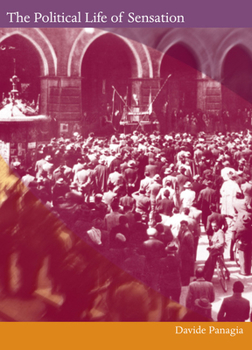The Political Life of Sensation
Select Format
Select Condition 
Book Overview
The taste of chocolate, the noise of a crowd, the visual impressions of filmic images--such sensory perceptions are rarely if ever discussed in relation to democratic theory. In response, Davide Panagia argues that by overlooking sensation political theorists ignore a crucial dimension of political life. Drawing on Gilles Deleuze's and Jacques Rancière's readings of Kantian aesthetics, Panagia posits sensation as a radical democratic moment of aesthetic...
Format:Paperback
Language:English
ISBN:0822344793
ISBN13:9780822344797
Release Date:April 2009
Publisher:Duke University Press
Length:232 Pages
Weight:0.75 lbs.
Dimensions:0.8" x 6.1" x 8.3"
Customer Reviews
0 rating





